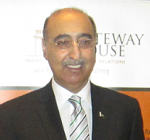India is on the brink of a crucial general election as Pakistan’s government – the first to experience a transfer of power from one civilian regime to another – prepares to mark a year in office. There is growing recognition that the two countries must move beyond historical differences and push the bilateral forward through an accelerated economic engagement. Sameer Patil, Associate Fellow, National Security, talks to Pakistan’s High Commissioner Abdul Basit about Pakistan’s expectations from the next government in India as well the steps the two countries can take to promote better ties.
Q. Looking at the state of bilateral relations between India and Pakistan, what are your expectations from the next Indian government?
I want to emphasise that Pakistan is interested in re-engaging with India as soon as possible. We hope to have a dialogue with the Indian government in a comprehensive and meaningful manner. This month we held a Pakistan expo in Mumbai and we have scheduled a single country-Pakistan exhibition in Amritsar in May to ensure continuity in the people-to-people exchange. Last month Sikh yatris went to Pakistan on the occasion of Baisakhi so relations are improving.
Q. How is Pakistan looking at the ongoing Indian elections?
There is interest in the Indian elections since India is an important neighbour for Pakistan and the developments here are of great interest to us.
Q. Pakistan’s delay in granting the Most Favoured Nation (MFN) status to India has generated much exasperation here. What explains the delay given that this will benefit Pakistan economically?
Our Prime Minister is very clear that Pakistan would like to have a comprehensive relationship with India. There is no effort on our part to delay these things, and once the next government takes charge in New Delhi, one hopes that all these things will be considered quickly and there will be conclusive progress.
Q. How does Pakistan plan to address India’s concerns regarding terrorism, especially the delay in trying those accused in the 26/11 Mumbai terror attacks?
As you would appreciate terrorism is a common enemy and knows no boundaries. We have to deal with this issue jointly. As a matter of fact, Pakistan has suffered from terror attacks far more than any other country in the world; so both our countries would benefit the most if we succeeded in eradicating this menace. I can assure your leaders that you will not find Pakistan wanting at any stage or at any point when it comes to tackling terrorism.
Q. Can you elaborate on the steps taken by the current government to fight terrorism?
The Internal Security Policy as well as the Pakistan Protection Bill which was long pending has been debated and finally adopted by our Parliament. I think this is a very significant step as we now have a legal framework to work with in dealing with terrorists as well as criminals. There were loopholes in the past which the Parliament has tried to plug with the current bill. I think we are now in a far better position to deal with terrorism.
Q. One of the important issues in the bilateral is the cross-LoC trade. In January, there was an incident where drugs were seized from a truck coming from Pakistan into India. How do you intent to tackle such issues?
That was very unfortunate and we believe that one such incident carried out by a few individuals should not have led to the stoppage of cross-LoC trade. But, now trade has re-started and we hope that such incidents will not recur. At the same time we hope that the driver who has been arrested will be released soon because we believe that he is innocent and had nothing to do with the contraband. We are working with the Indian authorities on this and one hopes that things will move forward.
Q. You recently stated that youth exchange programmes between India and Pakistan are important to build peace and stability. What specific steps do you intend to take to promote such programmes?
We would like institutions in Pakistan and India to enter into bilateral frameworks and have exchange programmes. For example, the Sanskriti School in New Delhi had a model United Nations conference in which Pakistani students participated. I was invited for the closing ceremony and was very upbeat to see Pakistani students interacting with their Indian peers.
Similarly, we would like to have exchanges at the university level with our students coming here for research, and vice-versa. This will create greater understanding between the youth from both sides of the border. We need to tackle the stereotypes that have led to much negativity in our ties. If the youth come together and question them, that will augur well for our future.
This interview was exclusively conducted for Gateway House: Indian Council on Global Relations. You can read more exclusive content here.
For interview requests with the author, or for permission to republish, please contact outreach@gatewayhouse.in.
© Copyright 2014 Gateway House: Indian Council on Global Relations. All rights reserved. Any unauthorized copying or reproduction is strictly prohibited.


